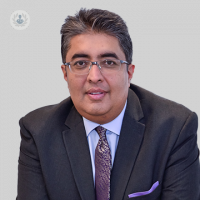A complete guide to choosing rhinoplasty surgery
Written by:With an increasing number of surgeons and clinics offering rhinoplasty surgery, it’s getting more and more difficult to identify the best care available. Here to guide you through the process is Mr Santdeep Paun. As well as being one of the best nose surgeons in London, Mr Paun is in regular contact with top rhinoplasty clinics at international conferences.

Which type of doctor should I see for a rhinoplasty?
The simple answer to this is someone who specialises in rhinoplasty.
Rhinoplasty is widely recognised as the most challenging and difficult of all cosmetic procedures . So it's important to see someone who performs this regularly, rather than as part of a more wide-ranging practice which may involve other unrelated procedures.
No surgeon can excel at all procedures and given the complexity of rhinoplasty and the very central position on the face, it makes sense to see a specialist in this procedure. As someone who trained in and treats all aspects of the nose, I have the advantage of being able to deal with both the cosmetic form but also the function.
What should I consider before getting a rhinoplasty?
There are many things to consider before getting a rhinoplasty:
- Do I have any associated breathing problems that need fixing?
- What aspects of the nose bother me the most? I always ask patients for their top three concerns.
- How do I know who to see about this? No doubt do lots of research and speak to others but beware fancy websites/adverts. Do thorough due diligence and meet with your surgeon and gain confidence with them.
- Will I get the appropriate post-op care? Make sure the hospital you are being operated in is reputable and not just a small clinic. Most times things will be fine but you want to ensure you are safe in case of any untoward complications. This may particularly apply to those seeking treatment abroad - it may be tempting to go abroad because it may be cheaper, but will the aftercare be available?
- Are there different methods for rhinoplasty procedures? How do I know which is right for me?
Again, doing some research and reading is important but ultimately it will be your surgeon who will make those decisions based on their own experience.
Surgeons may have their own different techniques to achieve the same overall goal. I lecture extensively internationally with the best surgeons not only in London but in the world – and there are often friendly (and occasionally heated!) debates about ideas on techniques and procedures. It is a way of us all learning from each other, sharing new thoughts and refining procedures and a hugely enjoyable part of my working life.
If surgeons have such varied opinions, clearly a patient cannot be expected to know what the correct procedure would be. It is best to be aware of and discuss the procedure you are having with your surgeon – but ultimately you need to have confidence in the person you pick and let them make the final decisions.
What should I know about the healing process after rhinoplasty?
The healing process after rhinoplasty takes time and patience is a virtue! There will be swelling and bruising in the first two weeks or so and whilst these rapidly settle, there will be subtle changes occurring over the nose for the weeks and months to follow - even up to a year and beyond, particularly in thicker-skinned patients.
That is not to say you won’t see a difference until that time - clearly the post op changes will be visible from soon after the plaster over the nose is removed after a week or so. But time lets the swelling settle further and more definition will be visible as this reduces over a period of time.
Most people take about two weeks off work and normally should be able to return to a normal routine after that.
Is rhinoplasty suitable for everyone? What other options are there?
There may be many reasons why a patient is not suitable for rhinoplasty surgery, varying from specific reasons related to their anatomy, their general health including mental health, right through to the patient being unrealistic as to their wishes and desires.
We spend a lot of time discussing patient concerns and then relate to them to what can and cannot be achieved based on their own individual anatomy and skin type - and indeed in relation to their other facial features. We usually use three-dimensional software programs to show patients what the possibilities are.
In some cases, non-surgical 'filler' rhinoplasty can help to camouflage certain features to achieve a better looking nose. These have limitations and obviously cannot achieve the same result as surgery, but for some patients wanting subtle changes only, this can be helpful, albeit as a temporary treatment that will eventually disappear over a period of time.
If you're looking for a carefully-tailored rhinoplasty in London by a leading expert, arrange an appointment with Mr Paun via his Top Doctors profile.


